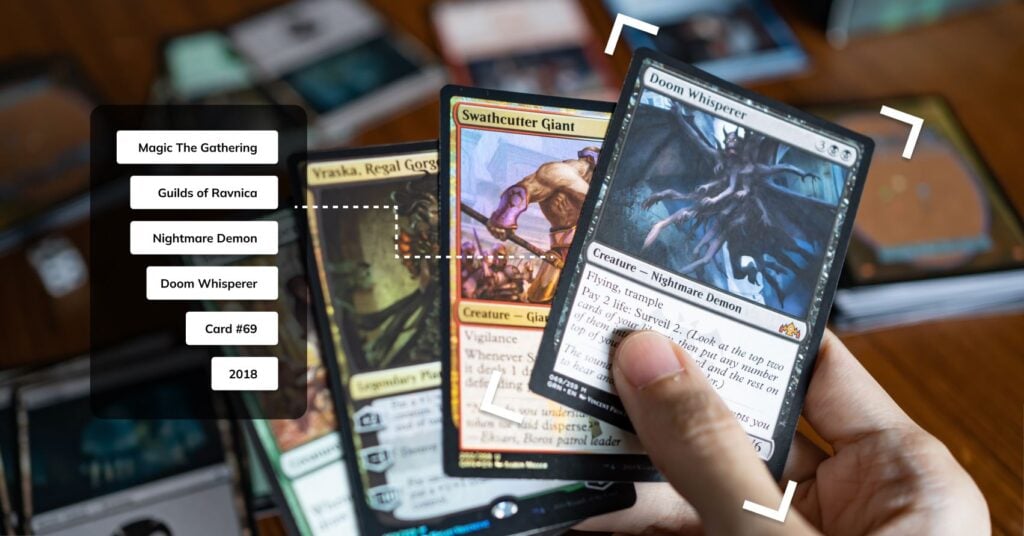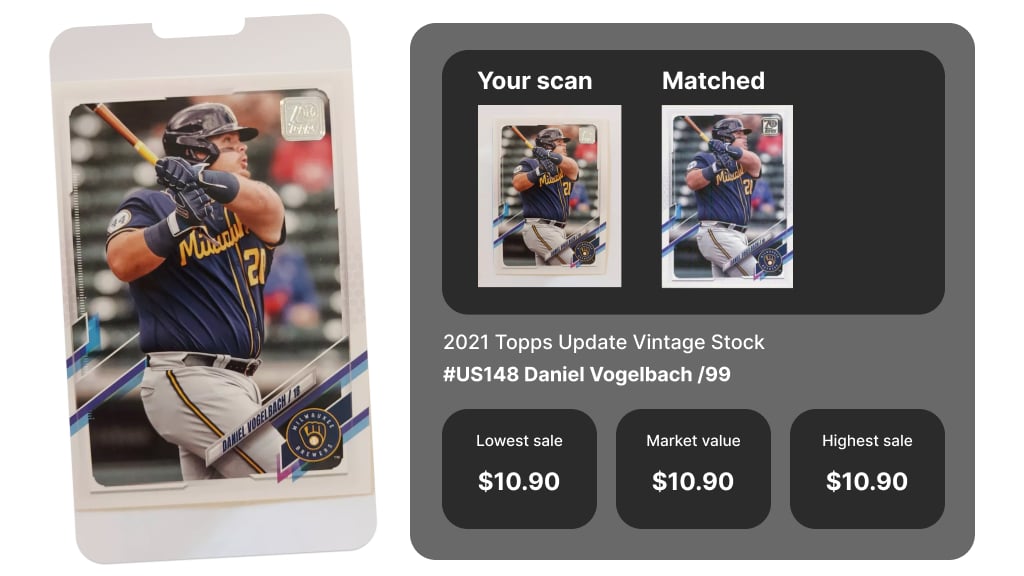In one of my previous blog posts, I wrote about how we built a visual search engine for trading cards such as Pokémon TCG, Magic The Gathering or sports cards. This customized visual search engine is very precise, but it’s suitable mainly for collector shops & websites that already have their own collections of photos or cards that can be matched to the pictures uploaded by players.
However, as the world of trading card games expands, collectors increasingly require a versatile trading card game identifier. This tool should swiftly recognize various collectible cards, irrespective of your private collection or database. We accepted this challenge and built a Trading Card Game Identifier (Card ID). In this article, I will describe how it works, and how you can use it for your own App or website. We will also take a brief look at other additions to our Collectibles Recognition: OCR & grading system for both TCGs and sports.
Trading Card Games Identifier
What is the Card Identifier?
Card Identifier is an AI-powered tool by Ximilar able to recognize trading game cards in any image format and provide you with their attributes, such as the name, exact set, series, codes, number, or year of release. It also provides attributes such as information on whether the card is holo (foil-treated) or what alphabet or language it uses.
This solution is an extension of our core service AI Recognition of Collectibles (which does the basic image recognition of all collectible items) and expands its functionalities by detailed identification of specific trading games.
Card ID works independently of keywords and metadata. As a matter of fact, you can use it to generate keywords. You can save the output in JSON or use it for searching and filtering items on your webpage.
The attributes of cards, such as their name, date of release and set, are also typically used to find the trading card’s average price on marketplaces such as TCGPlayer or eBay. That is why for some cards, we can provide links to these sites right away.
There are several use-cases that you can use our card identifier, here are few of them:
- you can connect your card scanner like Fujitsu (fi-8170) and create an system for documenting & digitalising your card collectors inventory, save thousands of hours with AI analysis
- you can build a smartphone app that is able to identify a card from photo and get average price on ebay or tcgplayer
- you can create your own marketplace website for card reselling & listing. Our technology will help with card identification of incoming submissions.
Because our solutions are powered by computer vision, you can upload photos of as many cards as you want, with or without sleeves, under different lighting and conditions.

Which Games Can the Trading Card Game Identifier Recognize?
Pokémon TCG
The Pokémon Trading Card Game is one of the most popular trading games. Fans of all generations and nationalities have been playing Pokémon TCG ever since its release in 1998. Our identifier recognizes Pokémon cards in both English & Japanese and provides their attributes.

Magic The Gathering
MGT is a highly popular game. As of 2023, over 100 MTG sets have been released, with their numbers continually rising, making it increasingly challenging to keep pace with all the sets and new cards. Our identifier provides all basic information about the Magic The Gathering card in an uploaded photo, and we keep adding new attributes.
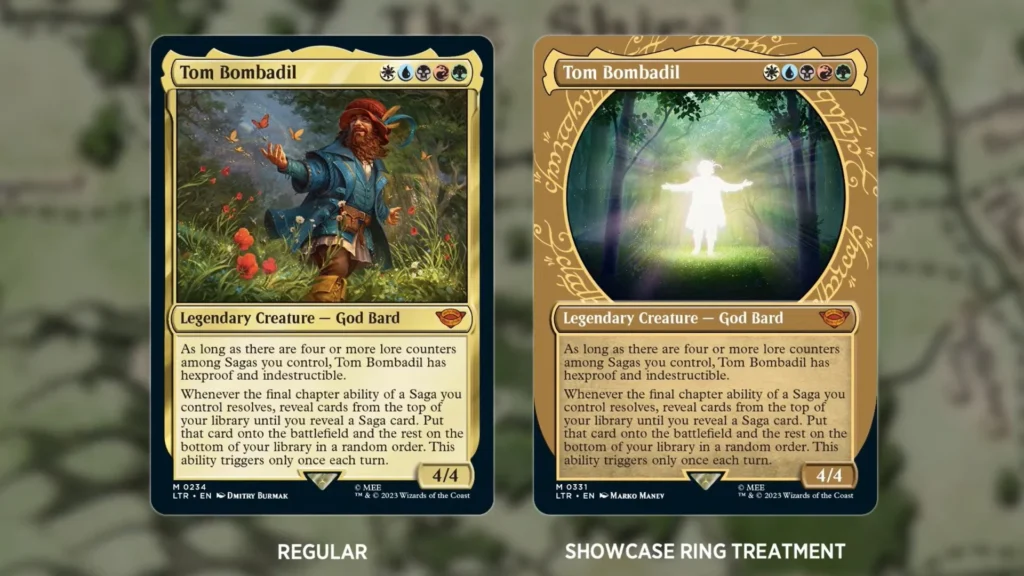
Yu-Gi-Oh!
Yu-Gi-Oh! is an iconic trading card game based on an anime series. Since its 1999 release, Yu-Gi-Oh! has garnered a dedicated community of players and collectors. Recognized as a top-selling TCG in 2009 by Guinness World Records, with over 22 billion cards sold worldwide, the demand for an AI model to assist with card identification is understandable.
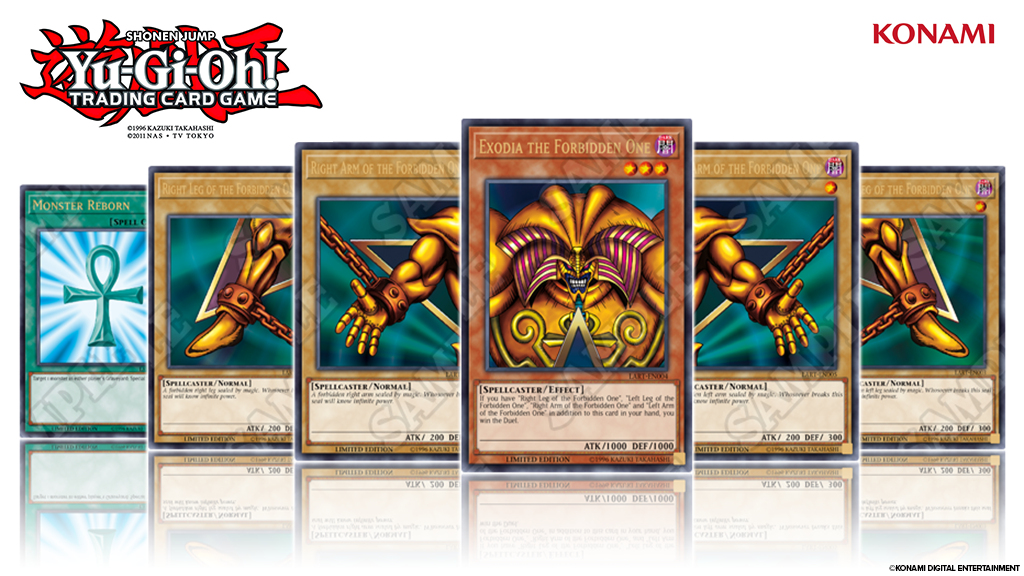
From MetaZoo to Lorcana
TCGs such as MetaZoo TCG, Flesh and Blood TCG, One Piece Card Game, or Lorcana TCG are all smaller or more recent games, but they are starting to be more and more popular both in English-speaking and Asian countries.
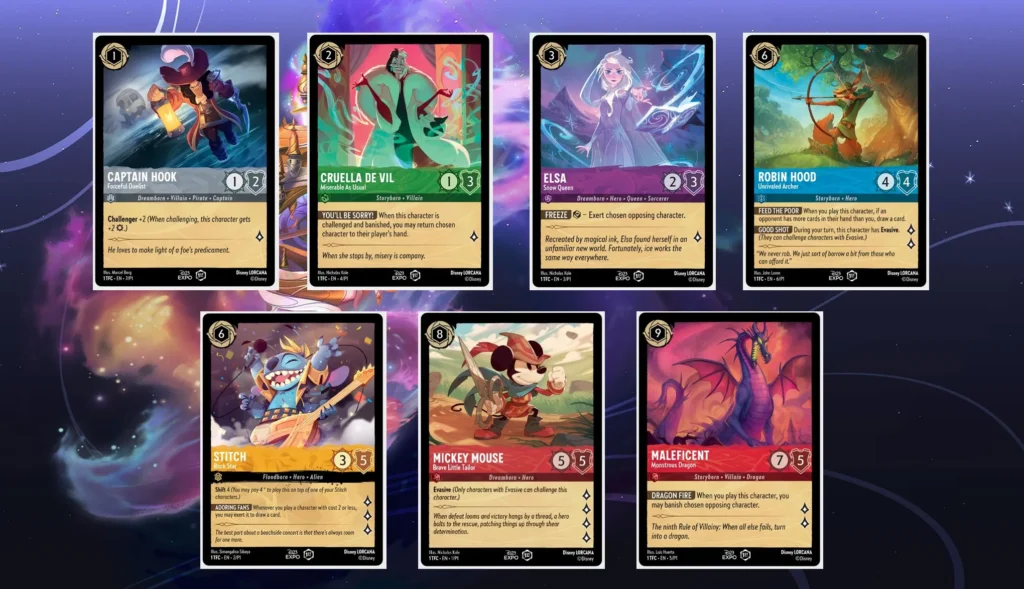
Independent of card type, this endpoint will also provide information such as:
Side – front or back of the card.
Alphabet – such as Latin, Japanese, Korean, Chinese, and more.
Holo/Foil – whether the card has a holo effect (aluminium foil).
Autograph – this particular feature is common rather for baseball and other sports cards.
All this information is necessary to value trading cards properly. For instance, a Japanese card can have a different value than an English one, and a holo card can have a higher value than a regular one.
How Identifying Trading Card Games via API Works?
Connect to API
Once you register in Ximilar App, you will automatically get your own unique API token. You will need at least business pricing plan. Then you can access and use our solutions both via App & API:
In the App, Card ID is a part of the Collectibles Recognition service. So if you upload your images there, the trading cards in them will be automatically recognized and identified.
The REST API endpoint is simple to use and easy to integrate into your mobile app, website or card-sorting machines. If you’re new to deploying solutions via API, the API documentation is here to help you with the basic setup. You can also find a lot of helpful information in our Help Center.
- For a lot of cards we are able to provide links to TCG Player or Cardmarket so you will know the price of analysed cards immediatelly.
To access the Card Identifier by Ximilar, use the endpoint /v2/tcg_id:
https://api.ximilar.com/collectibles/v2/tcg_id
We are always here to answer your questions through the contact form or live chat and can also do the setup for you.
Implement Trading Card Game Identifier in Your App
Imagine you are building an app or a site catering to Yu-Gi-Oh! fans and collectors. When a visitor uploads a picture of a new card, our AI Recognition of Collectibles instantly detects the card’s position and confirms it as a trading card. Thanks to its object detection & image recognition capabilities, users can upload pictures containing multiple cards.
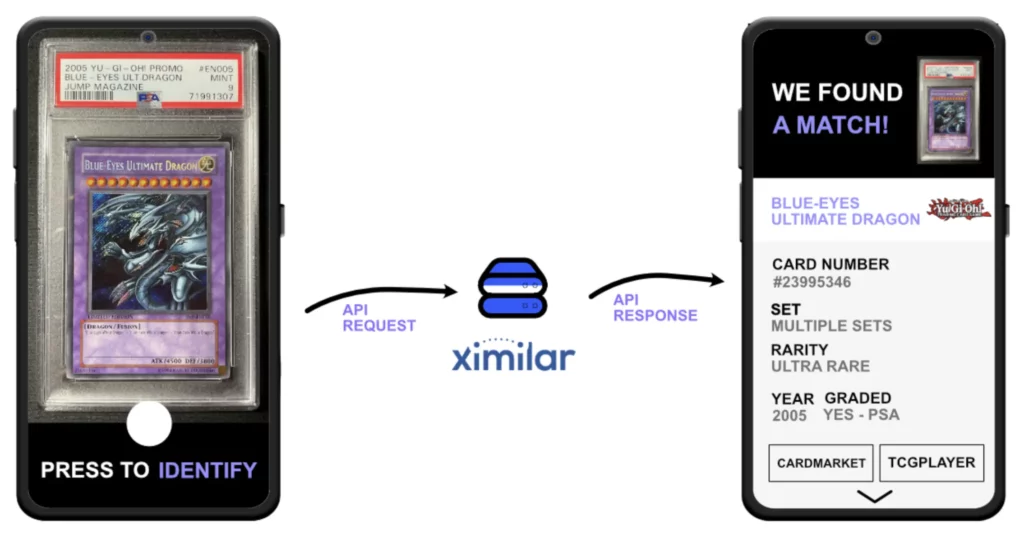
Subsequently, the Card ID provides the card’s attributes Name, Full Name, Set, Set Code, Card Number, Rarity and Year. This happens independently of your portfolio (collection) or database.
The identification of the record is fast (usually takes a second to process) and the results are provided in JSON. This way, the user can be provided with structured data on their trading card in a matter of seconds.

The identification works for almost all popular TCGs. And the good news is that our AI for card recognition is so powerful that we can extend it to other games. Let us know if you are missing any games.
New Solutions For Sports Cards
Sports Card Text Analysis With OCR & GPT
Because there are millions of sports cards, and it’s very hard to gather data for them, we have recently released another solution for text extraction from sports cards. The system is accessible via this endpoint:
https://api.ximilar.com/collectibles/v2/card_ocr_idThis technology is able to read all the texts in the photo with a card via Optical Character Recognition (OCR) and then provide information on the athlete via Large Language model (LLM) – GPT. This model is still in the works, however, it can help you with the automatization and labelling of the cards. If you have your own collection of sport’s cards then we can build you a precise, fast and affordable AI system for sports card identification.

You can read more about this solution in the article When OCR Meets ChatGPT AI in One API.
Read Graded Slab Labels With AI
Sports card grading is gaining popularity not only in the USA but also in Europe and Asia, as collectors recognize the value of their cards. Having rare foiled cards evaluated by esteemed companies like PSA or Beckett may be a good investment.
Online trading has become a prevalent trend, with eBay leading the pack as the go-to marketplace for collectibles. However, searching for the best deal among thousands of results for a specific query, like a “Michael Jordan Graded Card” can be incredibly time-consuming and challenging.

Our endpoint slab_id reads the graded slabs and helps to automate the identification of promising cards:
https://api.ximilar.com/collectibles/v2/slab_idIt will read the slab and return attributes such as grade, name, grade company and certification number. You can use it to automatically find and filter items with certain grades or conditions (8/9/10, near mint, gem mint, and so on).
Pre-Grading of Sports Cards With AI
We also provide an alternative to the slab reader in case the uploaded card doesn’t have a grade yet. It is an AI-powered grader for websites that evaluate & sell sports cards. The system can grade whole cards as well as individual parts like corners, edges, or centering. It is accessible via endpoint grade (precise) or condition (lightweight and fast):
https://api.ximilar.com/card-grader/v2/grade
https://api.ximilar.com/card-grader/v2/condition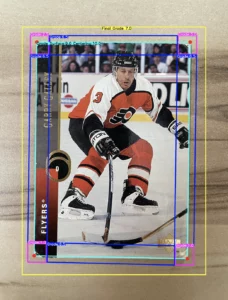
Because identifying grades from a single picture cannot fully replace a professional grader, this endpoint serves mainly as a pre-grading solution. As I write this article, it is currently in beta testing. Nonetheless, it has already proven effective in specific scenarios, particularly with high-resolution pictures of sports cards without sleeves or slabs. This feature was highly requested by many of our customers. So we made it accessible to both Business and Professional plan users.
Solving this challenge is no simple task, and it is a long-term project for us. We are working hard both on gathering training data and improving the model architecture. It serves also as a research project, as we encounter a lot of new and not quite standard things and problems. I will write more about this service, technology, and development in a future blog post. So stay tuned!
Automation in Collectibles Industry Makes Sense
Here are a few reasons why I think the trading card industry is growing rapidly, and will use AI-powered automation more in the future:
According to Business Research Insights, the global collectible card game market was valued at 13 billion USD in 2021. And it is projected to grow by 16% annually.
In 2022 alone, 10 million sports cards were graded, indicating significant demand for grading services.
The TCG potential has caught the attention of major corporations including Disney, evident from their release of the Lorcana TCG in 2023.
Companies like Nintendo earned nearly 43 million USD from card games playing last year.
Magic The Gathering remains Hasbro’s most profitable business venture.
Get a Solution Tailored to Your Business
All the services mentioned in this article are easy to combine with each other and with the rest of our solutions. One of the most popular solutions in the field of collectibles is a visual search and similar item recommendation. If you are aiming to have your own visual search engine, I suggest reading Pokémon TCG Search Engine: Use AI to Catch Them All and then contacting us.
The collector community’s feedback and thoughts serve as our primary motivation to develop tailor-made solutions for this amazing field. Contact us anytime and we can discuss your goals.
